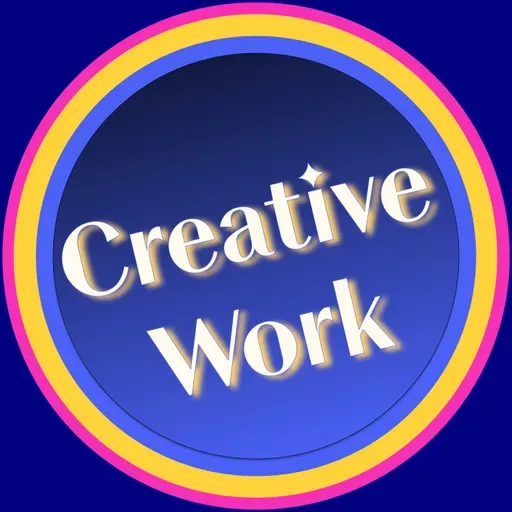
01 November 2025
Episode 69: What’s the Difference Between a Hobby and Creative Work?
Creative Work Hour
About
Creative Work Hour Podcast
Episode 69: What’s the Difference Between a Hobby and Creative Work?
Overview
Episode 69: What’s the Difference Between a Hobby and Creative Work?
Hosts: Alessandra • Greg • Shadows • Dr. Timeka • Devin
Overview
In this one-year anniversary episode, the team explores the nuanced line between hobbies and creative work. The conversation touches identity, seriousness, enjoyment, mission, and even taxes—without equating “work” strictly with money. The group also reaffirms the ethos of Creative Work Hour: a supportive, structured, judgment-free space to show up, share briefly, and do the work.
Episode Summary
Alessandra revisits her decades-long relationship with classical music and clarinet—how a pandemic-era reawakening transformed a painful history of stage fright into a renewed commitment to creative work. For her, calling it a hobby feels dismissive; it’s how she honors a gift, even without pay.
Greg frames creative work as carrying a message of kindness and supporting others through peer groups. He argues “work” doesn’t require financial gain; it can be mission-driven and identity-shaped.
Shadows keeps it simple: if it’s creative and fun, the label matters less. Enjoyment fuels sustainability.
Dr. Timeka offers a “three-legged stool” model—hobby, creative work, and pay—and suggests weaving all three for fulfillment.
Devin contrasts his chess hobby—serious yet pressure-free—with writing as creative work—deeply personal and identity-laden, requiring careful, selective feedback.
Key Quotes and Observations
Alessandra
Quote: “To me, those would be fighting words. Why? That’s not a freaking hobby. To me, that’s creative work.”
Observation: The distinction hinges on meaning, commitment, and identity. Her clarinet story highlights healing, craft, and respect for a talent—independent of compensation.
Noteworthy: She realized she was ignoring enjoyment because she equated “creative work” with seriousness only. A friend’s playful nudge (“sounds like you’re having fun”) helped her reframe.
Greg
Quote: “My creative work… is to carry a message of kindness into the world and try and bring a little bit of light into the darkness.”
Observation: Work can be mission-first. He runs support groups (brain injury, chronic pain, mental health) without monetary gain, yet treats them like true creative work.
Noteworthy: Labels can diminish or affirm. Calling a mission a “hobby” can strip its weight; meaning is defined by the doer.
Shadows
Quote: “As long as it’s creative fun and not just work, I don’t care if it’s a hobby or not.”
Observation: Enjoyment is a litmus test. If fun and creativity are present, it’s worth doing—labels become secondary.
Noteworthy: A pragmatic stance that cuts through perfectionism and helps keep momentum.
Dr. Timeka
Quote: “The three-legged stool… I take the hobby, I take the creative work, and I also take the third leg as being the pay component.”
Observation: Integration is key. Fulfillment comes from balancing enjoyment, craft, and compensation as needed.
Noteworthy: Deliberate design—choosing when and how each “leg” supports your practice.
Devin
Quote: “You talk about my writing and we may have to step out back.”
Observation: Hobby vs. creative work often hinges on identity investment and stakes. Chess is a serious hobby he’s okay failing at; writing is creative work with protective boundaries and selective feedback.
Noteworthy: Practical reminder from his tax-preparer past: the line between hobby and business can literally cost you—“about 30% depending on your tax bracket.”
Main Takeaways
Creative work is defined by identity, intention, and commitment—not just payment.
Hobbies can be serious and skill-building, but typically carry lower stakes and pressure.
Enjoyment isn’t opposed to creative work; it fuels persistence and quality.
Be selective about feedback on your creative work—protect the things that carry your identity.
A balanced practice can include hobby, creative work, and pay—blend them to fit your life.
Episode Highlights
Alessandra’s clarinet resurrection: a powerful account of reclaiming an abandoned craft, reframing stage fright, and honoring talent without tying it to income.
Greg’s mission-driven definition of creative work: support groups as artistry of care.
Shadows’ minimalism: fun is the backbone—if it’s fun and creative, do it.
Dr. Timeka’s framework: use a “three-legged stool” to stabilize and align your practice.
Devin’s contrast: pressure-free learning in hobbies vs. identity-heavy creative work; guard your work with selective feedback.
About Creative Work Hour
Structure: Share for five minutes, mute, do the work for an hour, then share five minutes of progress.
Why it works: Safe, kind, and consistent. Family and friends may love you but not care about your creative process; CWH fills that gap with support and trust.
Join: Visit creativeworkhour.com for ethos and details. To inquire about the small, trust-centric group, contact Alessandra (1L2S) on social media: @AlessandraWhite.
Calls to Action
Reflect: What does the difference between a hobby and creative work mean to you?
Share: Tell us at creativeworkhour.com.
Return: Come back next week for another topic and hour of focused creative practice.